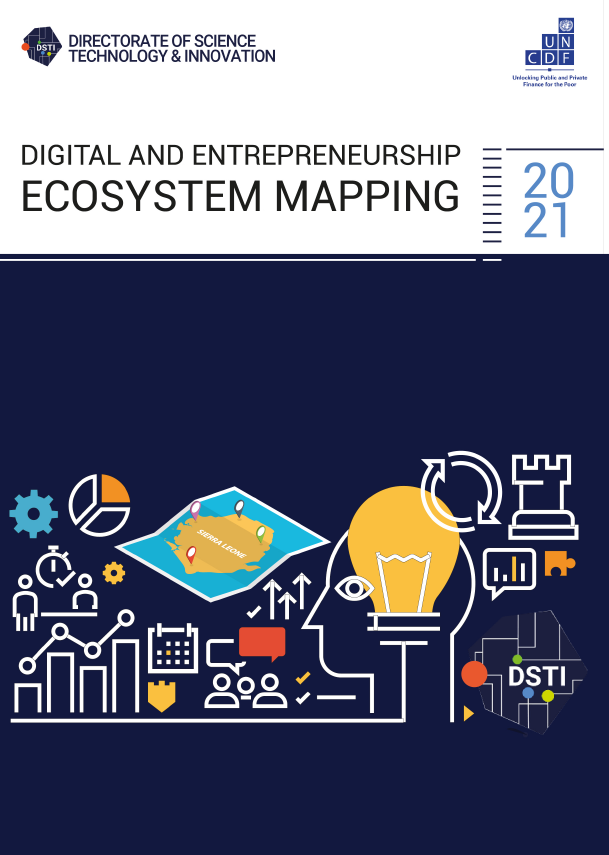Mapping the Sierra Leone digital and Entrepreneurial Ecosystem (Part 2)
Tags
The countrywide digital and entrepreneurship ecosystem mapping exercise conducted by the Directorate of Science Technology and Innovation at state house in collaboration with the UNCDF and other partners officially ended in June 2021. Subsequent to an earlier blog published on 28 June 2021 here, the mapping exercise aimed to bring technology and entrepreneurship together on one platform for the two ecosystems to interact and build off each other. The project aimed at mapping tech-ecosystems across Sierra Leone by collecting both qualitative and quantitative data to better understand and support entrepreneurs. This exercise focused on identifying companies applying technology to solve problems in various sectors, whether in agriculture, finance, medicine, education, energy, manufacturing, or other support services for the evolvement of the ecosystem.
The interactive digital platform is a directory of ecosystem players, consolidation of processes, and a marketing and advertising platform. The platform follows the Inclusive Digital Economy Scorecard (IDES) framework, which is a strategic performance tool developed by UNCDF. The IDES is a policy tool that governments can use to help set the priorities for their country's digital transformation. The findings and recommendations from the study are summarized below.
Digital Infrastructure in Sierra Leone
Without the proper digital infrastructure, businesses can’t incorporate and leverage digital technologies. In other words, if the digital rails are not in place, businesses can’t access reliable and affordable internet and mobile services. The digital rails encompass, among other things, connectivity, access to devices and basic payment services. To bridge the digital divide and allow for a digital economy to thrive, the digital rails need to be strengthened.
While Sierra Leone was one of the first countries in West Africa to commit to improving the geographical reach of high-speed connectivity, the country still ranks low in terms of access (153 of 207 economies for mobile access and 197 of 208 for internet access); affordability (57 of 61 economies) and quality (151 of 173 economies) [1]. The civil war, which spanned over ten years, caused significant infrastructural damage, especially to the fixed-line infrastructure.
Other infrastructural challenges for businesses are the poor state of the road network and lack of access to electricity (access rate in Sierra Leone is 22.7% (2019). ) [2]
In spite of the issues mentioned above, businesses use mobile money and social media, with 71% and 70% of businesses interviewed using these technologies respectively. The most common social media platforms for businesses are WhatsApp and Facebook.
The report recommends that government, private sector and development partners need to come together and be intentional in enabling the development of infrastructure to support the digital ecosystem. The Government should also take a more proactive and collaborative approach in developing initiatives and implementing them. The Government must take the lead in the digitalization of government processes, services and payments.
Entrepreneurship in Sierra Leone
In the Entrepreneurial space, out of almost 800 businesses that were interviewed, 84% were sole proprietorships, 11% were partnerships, and 3% were limited liability companies. When asked about reasons for starting their business,70% of interviewees said they started their business to take care of themselves and their families, 35% said they did so to contribute to society through job creation, whiles 33% linked their motive for starting a business to solving a problem or meeting a need. Thus, most businesses in Sierra Leone are operating with a survival motive. As a solution, the report recommends that stakeholders invest in developing a pool of growth entrepreneurs by developing collaborative training for local entrepreneurs. The Government and other industry players must also come up with strategies to attract potential entrepreneurs from the diaspora. In addition, entrepreneur success stories must be showcased at different forums to motivate upcoming entrepreneurs. There must also be an intentional drive by industry players to get the population to change its mindset from “survival” to business growth and investment.
With regards to formalization of businesses, only 36% of interviewed businesses are formally registered, a phenomenon that makes it difficult to get reliable data on entrepreneurs and formulate strategies for the sector. As recommended, the Small and Medium Enterprises Development Agency (SMEDA) must come up with awareness programs to get more businesses registered. SMEDA must also work with the Corporate Affairs Commission (CAC) and the Office of the Administrator and Registrar General to simplify registration requirements, especially for informal businesses.
In the area of gender distribution, fewer businesses are owned by women in a country where women outnumber men. 38% of interviewed businesses do not have any female employees, 23% have only one female employee, 15% have two female employees, and 9% have more than five female employees. It is recommended that SMEDA supports women's entrepreneurship through capacity-building programs specially targeted at women. This will improve economic opportunities for a lot of women entrepreneurs and their households.
Lack of access to and unavailability of affordable finance remains a major challenge for most businesses. For 66.5% of the businesses, the primary source of start-up capital was their personal savings. Other common sources are gifts and loans from family and friends. The least common sources are external investments, grants, and loans from banks and microfinance. Businesses attributed their lack of interest in bank loans, for instance, to the high cost of loans and the collateral requirements. As a recommendation, there must be a focus on venture building by developing businesses that will address some of the country’s major challenges, including waste collection and management and energy challenges.
Finally, given the high digital literacy gap in the country, digital skills and literacy must be integrated into the national school curriculum at all levels.
The full report published on our site here outlines all the findings and recommendations, including policy recommendations.
[1] Data sources from the DE4A report (https://elibrary.worldbank.org/doi/abs/10.1596/35805) Pages 41_43
[2] Sierra Leone-Access to electricity (% of population)- https://tradingeconomics.com/sierra-leone/access-to-electricity-percent-of-population-wb-data.html
